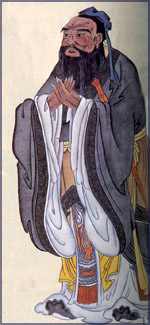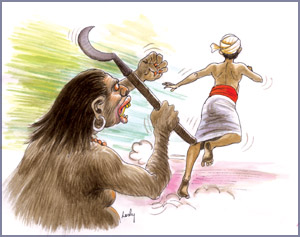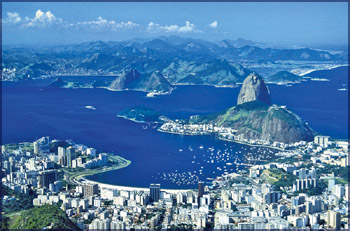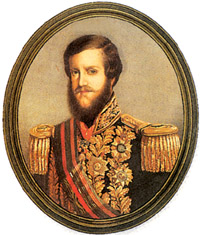|

Confucius
Confucius was born in about 551 B.C. in the small state of Lu, where
many Zhou traditions had been preserved. Confucius travelled from state
to state and advised many rulers.
In his travels, he attracted students. After Confucius’s death, these
students wrote down many of his thoughts and ideas, as well as stories about his life. These writings are
collected in a book called the Analects.
and ideas, as well as stories about his life. These writings are
collected in a book called the Analects.
Confucius believed that society could be made fair and good. What do
the Analects say about how people ought to behave?
Confucius did not start a religion. He saw himself as a teacher who
gave knowledge of the past to people in the present. He studied the past
and copied the example of such men as the duke of Zhou.
Be dutiful at home, brotherly in
public; be discreet and trustworthy...
The progress of the virtuous person is
upwards; the progress of the selfish person is downwards.
The virtuous person is modest in his
speech, but (excellent) in his actions.
When a country is well governed,
poverty and corruption are things to be ashamed of. When a country is
poorly governed, riches and honor are things to be ashamed of.
When a prince’s personal conduct is
correct, his government is effective without the issuing of orders. If
his personal conduct is not correct, he may issue orders, but they will
not be followed.
Excerpt from the “Analects of
Confucius” - written c. 500 B.C.
Folk tales of Sri Lanka:
The sorcerer and the demon
Retold by R.S. Karunaratne
A long time ago there lived a sorcerer in a remote village. Everybody
feared him because he could bring about evil on them. He himself was a
sturdy man who was fearless.
One day he thought of employing a village lad to run his errands and
do his household work such as cooking and washing clothes. But nobody
wanted to work for him because of his evil activities.
The sorcerer was a resourceful man. He wanted somebody to help him
very badly. As nobody wanted to work for him, he thought of employing a
demon - an evil spirit - by using his magical powers.
 As
he was living alone he had the uninterrupted freedom of preforming
various rituals to get the services of a demon. At the end of chanting
various stanzas, a ferocious demon appeared before him. The demon asked
why he was called by the sorcerer. As
he was living alone he had the uninterrupted freedom of preforming
various rituals to get the services of a demon. At the end of chanting
various stanzas, a ferocious demon appeared before him. The demon asked
why he was called by the sorcerer.
“You are a ferocious demon, no doubt. But from today you are going to
be my obedient servant. You are not to go any where without my
permission. You have to carry out all my instructions. If you don’t obey
my orders, I’ll banish you to a far away country. There you will have to
work for dangerous demons who will not allow you to live in peace”.
The demon looked at the sorcerer with pleading eyes.
“Now go and wash all my clothes,” the sorcerer gave him the first
order.
The demon re-appeared before the sorcerer within a few minutes.
“Did you wash all my clothes?”
“Yes, Master. I take only a minute to do such simple jobs,” said the
demon looking hard at the sorcerer.
The sorcerer knew that the demon could turn out to be a dangerous
spirit if he was not kept occupied. Then he thought of another plan.
“Now go to the market and buy some vegetables. Come home soon and
cook my mid-day meal,” the sorcerer said.
The demon disappeared. In a few minutes he re-appeared with a tray
full of rice and curry. He invited the sorcerer to have his meals. The
sorcerer was thoroughly surprised by the rapidity with which the demon
prepared his meals.
After eating his mid-day meal, the sorcerer wanted to have a nap
sitting in his hansiputuva (an easy chair). Before he could say Jack
Robinson, the demon appeared before the sorcerer.
In order to keep him occupied the sorcerer called the demon and
ordered him to put up a stone wall around his property. Before he could
finish the job the sorcerer ran away as fast as could. He knew that an
idling demon could even kill his master.
After putting up the stone wall in no time, the demon looked for his
master to get another order. Finding that he was missing the demon
picked up a large billhook and started running after the sorcerer.
Sensing that he was in great danger the sorcerer drew a line across
the road beyond which the demon could not come. The demon was so angry
that his master was running away from him. The sorcerer regretted for
engaging a demon to do his household work.
The sorcerer started running again. Unable to cross the line, the
demon threw the billhook towards the sorcerer in order to kill him.
However, the billhook did not kill the sorcerer. Even today the village
is known as “Keththa Pahuva”.
Thoughts that helped make the world a better place:
Independence for Brazil
Contiued from last week
Simon Bolivar has been called the “George Washington of South
America.” Like Washington, Bolivar led a war for independence and was
his country’s first president. Also like Washington, Bolivar was famous
for his honesty.
Bolivar had a dream - a “United States of South America.” Bolivar
wanted Spain’s former colonies to unite as the
|

Rio de Janeiro |
13 English colonies in North America had. He never saw his
United States of South America.” His honest opinions about other leaders
made him unpopular.
Today, Bolivar is seen as a great leader and an honest man. His idea
of a South American union may also be reconsidered.
Independence for Brazil
Brazil was a Portuguese colony. Napoleon conquered Portugal as well
as Spain, but Brazil became independent without a war.
The colony becomes a country
In 1807 the French invaded Portugal. The King, John VI, and many
Poruguese nobles set sail for Brazil. The king settled in Rio de
Janeiro, Brazil’s largest city.
King John was popular in Brazil. He opened Brazilian ports to all
countries. He built a royal library, a military academy, a law school,
and a medical school in Brazil. Finally he issued a decree, or royal
command, making Brazil a part of Portugal rather than a colony.
Napoleon was defeated in 1815, but the Portuguese king remained in
Brazil until 1821. When the king finally returned to Portugal, he left
his son, Pedro, in charge of Brazil.
A new nation
Trouble soon broke out between Portugal and Brazil. Portuguese
leaders wanted Brazil to be a colony again, not a part of Portugal. Laws
were passed to end many of the improvements the king had made in Brazil.
People in Brazil wanted Pedro to declare independence from Portugal.
In 1822, Pedro called an assembly and declared independence. He called
himself Emperor Pedro I of Brazil.
Unlike the rest of Latin America, Brazil did not fight a war for
independence.
However, Brazil had other problems. Emperor Pedro I was a harsh
ruler, and he made many enemies. In 1831,
|

Emperor Pedro II |
the emperor was forced to give up his throne and leave Brazil.
His 5-year-old son became Pedro II.
The last Emperor
Emperor Pedro II was a much wiser ruler than his father. He ruled
Brazil for 50 years and helped it grow into a strong nation.
Brazil was a rich agricultural country with coffee and cotton as its
two leading exports. Both crops were grown on large plantations with
enslaved Africans. Pedro II wanted to end slavery, but the plantation
owners were the most powerful group in Brazil. The emperor managed to
free groups of slaves gradually until slavery was finally ended in 1888.
The end of slavery also marked the end of the emperor’s rule. The
slave owners rebelled and forced him to leave Brazil, but they could not
restore slavery.
Putting it together
The French and American revolutions encouraged Latin America’s fight
for independence. In 1791, Toussaint L’Ouverture and an army of slaves
freed Haiti from French rule.
In 1810, Father Miguel Hidalgo began Mexico’s struggle for
independence. Agustin de Iturbide finally defeated the Spanish, and in
1821 Mexico became an independent nation.
Jose San Martin and Simon Bolivar drove the Spanish out of their
South American colonies by 1830. However, dictators seized power and the
people of Latin American were still not free.
Brazil won independence without a war. The son of Portugal’s king
declared independence in 1822. Pedro II was a wise ruler, but he was
overthrown when he freed the last of Brazil’s slaves.
To be continued
Young scribes:
Rhinoceros
Rhinoceros, rhinoceros
Your hide is so dark,
It makes you look frightening.
Your hide is so wrinkly,
It makes you look fatty.
Rhinoceros, rhinoceros
Your horn is so sharp,
It makes me tremble.
Your horn is so big,
It makes me shiver.
But, what is this?
I find your hide,
Turned into a hand bag.
I find your horn,
Turned into a cup.
O, rhinoceros, rhinoceros
Why did you end up in a shop?
Were you not fierce enough?
To defend yourself.
**************
The silly dog
One day a dog found a bone. He was running across a log which bridged
the two banks of the river, with the bone in his mouth. He saw his
shadow in the water. He thought it was another dog carrying a bone. He
wanted that bone too. He jumped into the river barking at his shadow.
The silly dog drowned and lost his life.
Hashara Kavindhiya
Bandurathne
Gr. 3
Kalutara Balika National School
Kalutara |

